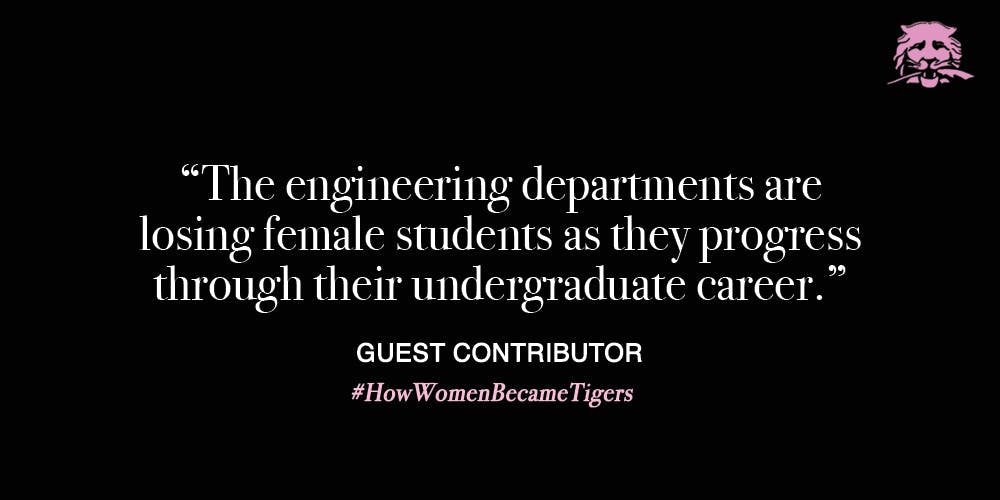For the past two weeks, Princeton University’s campus has been teeming with giddy high school students in bright orange lanyards and drawstring backpacks. Usually, they travel in packs of two to seven, though an occasional singleton can be found looking down at their phone before asking a passerby where the building called “Frist” might be. As I watch Princeton Preview unfold, I wonder: What will the Great Class of 2022 be like?
Of the 1,941 students who were offered admission, 50.5 percent were women and 49.5 percent were men. The University Office of Communications publishes these statistics the day that acceptances go out in a short article that is less than a thousand words. Though relatively brief, the article makes a point to mention the statistics on women in engineering: “Of the students offered admission, 24.8 percent indicated they want to study engineering and 48.3 percent of those students are women.” Unfortunately, this parity is not likely to last.
To understand why, let’s look at the same statistics for the Class of 2019. When these students were first admitted in 2015, women made up 44 percent of all admits who had indicated interest in studying engineering here at Princeton.
In the Class of 2018 and 2019 combined, there are currently a total of 682 juniors and seniors concentrating in engineering. Of the 682, only 240 of those concentrators are women — only 35 percent. Why did this initial 44 percent of female students drop down to 35 percent?
High school basketball coach Tim Notke once said, “Hard work beats talent when talent doesn’t work hard.” Put simply, this means that talent can only get us so far — hard work is what gets us places. However, when it comes to gender disparities in academia, his quote is not the end of the story.
There is a belief that in some fields of study, raw intellectual talent is required to excel. A recent study in psychology shows that people believe raw intellectual talent to be most necessary in fields such as philosophy, math, physics, computer science, and engineering, to name a few. In fields such as psychology, raw intellectual talent is not perceived to be necessary for success.
Whether or not these beliefs hold true, these beliefs hold power. Research shows that women are underrepresented in academic disciplines that are thought to require this raw intellectual talent (the same holds true for African Americans).
Knowing this, the University needs to be more mindful and proactive regarding its messaging in these fields so as to not further deter marginalized students from certain departments. I suggest that it start with the Mathematics Department’s website — a department whose classes typically include not only math majors, but also physics, astrophysics, and engineering majors, given that introductory math courses are often prerequisites for these departments. On the “Information for Math Majors” page, the first section boldly asks “Why Major in Mathematics?” The answer: join to find “exciting opportunities both for students who enter with a strong background … as well as for novices with strong mathematical aptitude and interest.” This “strong mathematical aptitude” is a synonym for a raw intellectual talent for math.

We know that women are underrepresented in fields where this raw intellectual talent is thought of as a prerequisite. Given the math department’s current messaging appealing to students with a “strong mathematical aptitude,” the next step is to look for signs of underrepresentation. And in fact, out of the 35 math majors in the Class of 2019, only seven are women. That’s 20 percent. And given the amount of non-math majors taking math classes, it’s easy to see how this attitude of required innateness can affect the other STEM majors.
Currently, the engineering departments are losing female students as they progress through their undergraduate career. To ensure that the Class of 2022 doesn’t end up like the Class of 2019, I suggest that we reexamine the way in which Princeton goes about defining a successful STEM student — starting with the math department and its messaging. If the University uses messaging that reinforces the belief that students’ hard work will pay off regardless of the field, then we can continue to shrink the gender gap for our future Princetonians.
Paige Amormino is a junior concentrator in psychology from Windsor, Calif. She can be reached at amormino@princeton.edu.









